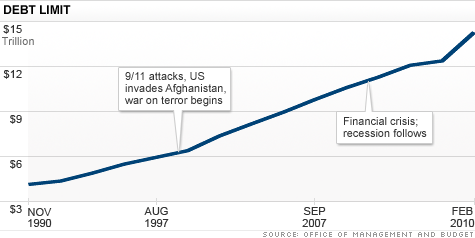- Aug 27, 2008
- 18,450
- 1,823
- 205
As of November 7th, the total U.S. public debt outstanding reached an astonishing $13.7 trillion. This means that although Congress just raised the debt ceiling to $14.3 trillion back in February, the new Congress will face another debt ceiling vote almost immediately next year. Otherwise, the Treasury will not be able to continue issuing debt to fund government operations.
The upcoming vote will provide an interesting litmus test for the new Republican congressional majority, especially those new members closely identified with Tea Party voters. The debt ceiling law, passed in 1917, enables Congress to place a statutory cap on the total amount of government debt rather than having to approve each individual Treasury bond offering. It also, however, forces Congress into an open and presumably somewhat shameful vote to approve more borrowing.
If the new Congress gives in to establishment pressure and media alarmism about shutting down the government by voting to increase the debt ceiling once again, you will know that the status quo has prevailed. You will know that Congress, despite the rhetoric of the midterm elections, is doing business as usual. You will know that the simple notion of balancing the budget, by limiting federal spending to federal revenue, remains a shallow and laughable campaign platitude.
Don't Raise the Debt Ceiling! by Ron Paul




